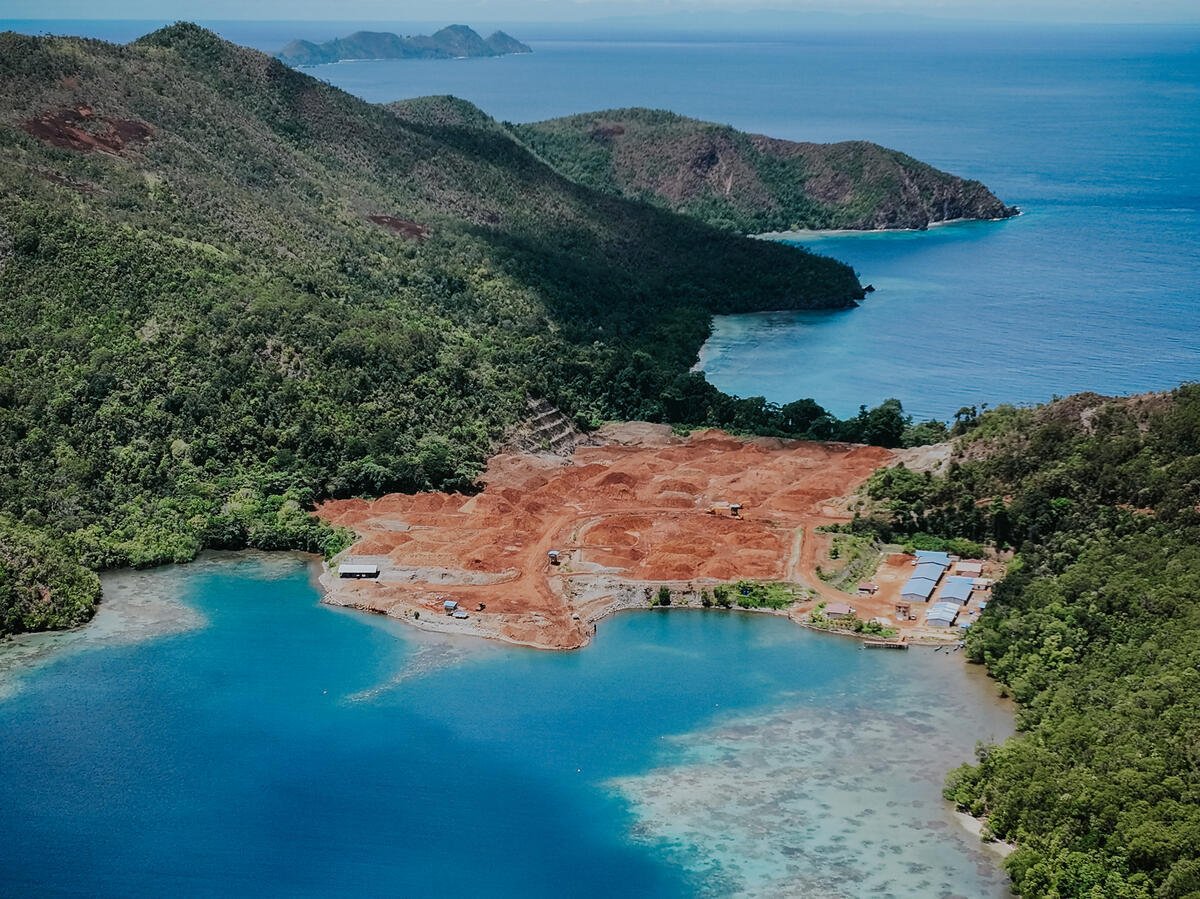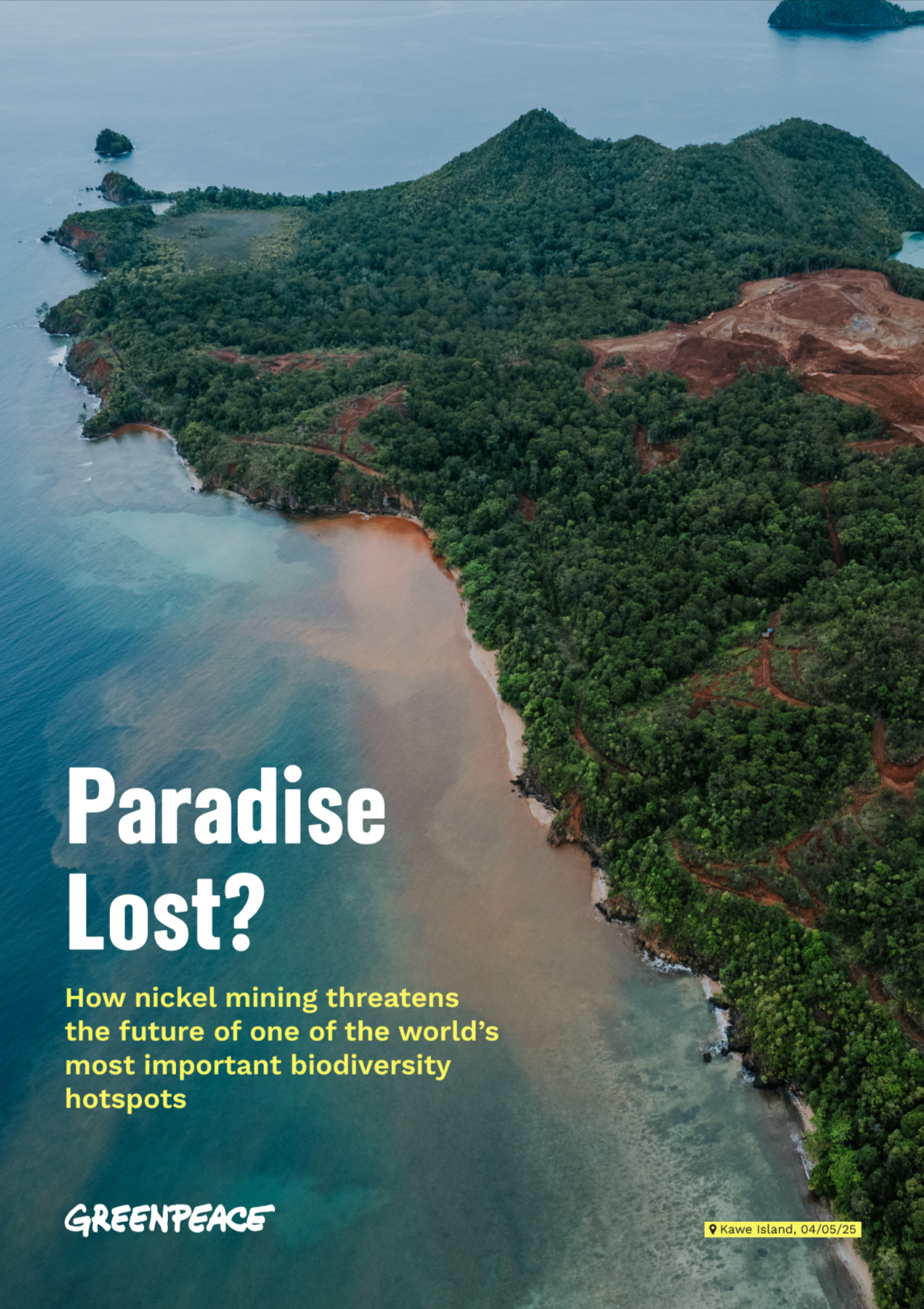Palangkaraya, December 2 2023 – Activists have revisited the scene of an eco-outrage to parody Indonesian president Joko Widodo’s disastrous flagship food estate program, which the leader spruiked yesterday in his speech to the United Nations climate summit in Dubai. In his speech during a session titled Transforming Food Systems in the Face of Climate Change during COP28 in the United Arab Emirates, President Jokowi urged financial and technological support to develop large scale food estates. Going as far as to claim that such investment in Indonesia could supply global food demand, he also proposed converting food into biofuel in the form of biodiesel and bioethanol.
The morning after Jokowi’s speech in Dubai, activists from Greenpeace, Central Kalimantan Legal Aid Foundation, Save Our Borneo, and the Indonesian Forum for Environment returned to the deforested location of a key food estate project, developed by Jokowi’s Minister for Defence, Prabowo Subianto, in Gunung Mas, Central Kalimantan. Posing as the serving president and the three registered candidates to replace him in next year’s election, of which the Minister of Defence himself is one, the activists played out a banquet scene to again send the message that the large scale food estate policy provides no solution to food insecurity, but actually exacerbates the national and global food and climate crises.
“The condition of this Gunung Mas food estate is pretty much unchanged since we documented the failure of this project a year ago in November 2022. There is no cassava plantation as promised to replace the 760 hectares of natural rainforest that were razed for this national strategic project. The now-lost forest was a vital habitat and source of life for the flora and fauna within it, for Indigenous Dayak people and the wider local community. It also played its part in holding back the progressive worsening of the climate crisis,” said Belgis Habiba, Greenpeace Indonesia Forest Campaigner.

Food security is one of the themes under discussion at COP28 in Dubai. The United Arab Emirates has used its position as host nation to announce the Emirates Declaration on Sustainable Agriculture, Resilient Food Systems and Climate Action, which emphasises the importance of integrating food and agricultural systems into climate action efforts by reducing their contribution to greenhouse gas emissions and environmental degradation.
Unfortunately, President Jokowi has detoured seriously off-course to instead promote unsustainable large-scale food estates and the conversion of food – such as palm oil, cassava and corn – into biodiesel and bioethanol. The pursuit of biofuels is a false solution that will drive the expansion of monoculture plantations, leading to carbon emissions and biodiversity loss through forest and peatland destruction.
“Apart from here in Gunung Mas, the government’s food estate program is also encroaching on a vast area of carbon-rich peat in the failed former Mega Rice Project in Kapuas and Pulang Pisau districts. According to our observations, the new food estate project there is worsening peat damage and has triggered fires during September and October 2023. The government must stop this food estate folly, because a large-scale monoculture system like this is a false solution to the goal of food security. The government must thoroughly evaluate the implementation of the food estate project because public funds are being wasted in carrying out this project. Most importantly, the government must urgently restore damaged forests and peatlands in the area,” said Bayu Herinata, Director of Indonesian Forum for Environment (Walhi) Central Kalimantan.
True solutions to food security include Indonesia’s many traditional sustainable agroforestry approaches, such as those practised by the Dayak Indigenous community in Kalimantan for thousands of years, along with ecological farming that ensures fertility without the use of chemicals by increasing soil organic matter, enhancing water retention, preventing land degradation and protecting soils from erosion and waterways from pollution.
“The food estate project – including the cassava in Gunung Mas and the peatland rice paddies in Kapuas and Pulang Pisau – were designed and implemented without involving the community. In Gunung Mas, the Ministry of Defense deployed soldiers and workers from outside the area. Meanwhile, the drained peatland rice food estate pushed by the Ministry of Agriculture applies a model that marginalises community agriculture in the field. In the context of food security, this monoculture agricultural system actually creates vulnerabilities because its implementation is centralised in one place, not devolved throughout the community,” said Muhamad Habibi, Executive Director of Save Our Borneo.
Director of the Central Kalimantan Legal Aid Foundation, Aryo Nugroho added that not only is the food estate project inconsistent with efforts to fulfil the right to food and the right to a healthy environment, but also ignores the rights of future generations. “The government does not think about the rights of future generations who will be most affected by environmental damage resulting from problematic projects such as this food estate. Are we just going to leave the damage for future generations to fix? The food estate is also increasingly marginalising the traditional farming culture of Borneo’s Dayak Indigenous people. This could be described as genocide against the culture of Indigenous peoples,” said Aryo.
The food estate represents a collective failure by President Joko Widodo and his ministers to honour biodiversity and climate commitments while carrying out government programs. This is also a failure of the House of Representatives to carry out its supervisory function. Instead of criticising this project from the start, the people’s representatives have only begun to speak out when their party’s stance clashed with President Jokowi’s ahead of the 2024 Presidential Election.
“This policy must be corrected by the next government. The presidential and vice-presidential candidates competing in the 2024 presidential election must not look away from this situation. The food estate policy is a failure and must be stopped,” said Arie Rompas, Forest Campaign Team Leader, Greenpeace Indonesia.
Note to editor:
Photos and videos are available of the Gunung Mas food estate parody action.
Media Contacts:
Arie Rompas, Greenpeace Indonesia, +62 811-5200-822
Muhamad Habibi, Director Save Our Borneo, +62 812-5544-6534
Bayu Herinata, Director of Walhi Central Kalimantan, +62 822-5511-5115
Aryo Nugroho Waluyo, Director of LBH Palangkaraya, +62 852-5296-0916
Igor O’Neill, Greenpeace Indonesia, [email protected] +61-414-288-424



